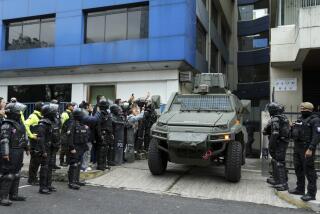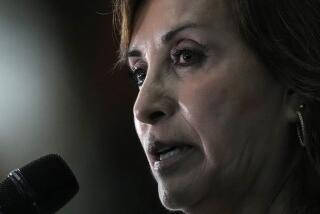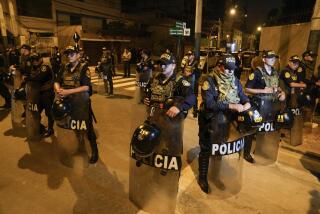Fujimori ordered returned to Peru
santiago, chile -- Former Peruvian President Alberto Fujimori was ordered returned to Peru on Friday after Chile’s highest court ruled that he must face human rights and corruption charges in his homeland, ending the flamboyant ex-leader’s long fight to avoid trial.
Experts said it appeared unprecedented for an ex-head of state to be ordered extradited to face justice in the country that he or she once led.
Fujimori, who has denied any wrongdoing and called the charges politically motivated, was expected to be flown back to Peru early today, but there was no confirmation from Chilean or Peruvian officials.
“This doesn’t mean I have been judged or convicted,” a calm Fujimori, 69, told the Chilean daily El Mercurio. “To be extradited was part of my plan.”
He told Peruvian radio that he had always acted “correctly,” while also acknowledging “gross mistakes” during his decade-long administration.
In the end, Fujimori failed to benefit from the foreign exile that has long shielded ex-heads of state accused of corruption and human rights abuses.
“This historic decision shows how the rules of the game have changed on issues of accountability for high-level officials responsible for abuses,” said Jose Miguel Vivanco, Americas director at Human Rights Watch, who was here for the announcement.
That the decision came down in Chile added a strong dose of irony, because that nation’s late dictator Augusto Pinochet narrowly escaped extradition from Britain to Spain in a landmark case. But Pinochet’s 1998 arrest in London and a subsequent judicial ruling that he was not immune from prosecution for torture and other charges weakened the near-impunity long enjoyed by former heads of state in exile.
“All of these precedents are linked together in international law, and there is a kind of domino effect,” Vivanco said.
A five-member panel of the Supreme Court here ordered the extradition of Fujimori on five corruption charges and in two human rights cases, including the death squad killings of 25 people during his 1990-2000 presidency. The judges rejected Fujimori’s claim of immunity as a former head of state.
The ruling, which cannot be appealed, was a body blow for the former Peruvian leader, who ruled the country in authoritarian fashion, at one point shuttering Congress and suspending the constitution. He was also a populist renowned for public works and job-creation programs, earning considerable support among the poor for spreading cash and patronage.
Even critics credit Fujimori with the taming of a violent leftist insurgency and the hyperinflation he inherited when the then-obscure agronomy professor was elected in 1990, thumping Mario Vargas Llosa, the world-famous novelist.
Fujimori made a splash on the global stage in 1997, when he sent a commando team to end a four-month standoff at the Japanese ambassador’s residence, where leftist militants had taken more than 500 people hostage. The sensational raid concluded with the death of one hostage, two commandos and all 14 guerrillas.
He was reelected in 2000 for his third term, but allegations of widespread fraud sparked a social convulsion and battered his government.
Amid a corruption scandal, Fujimori resigned via fax from Japan, the birthplace of his parents, pre-World War II immigrants to Peru.
The Chilean decision seems likely to roil Peru’s political world, where the bespectacled Fujimori remains an extremely divisive figure. To some he is a corrupt ex-tyrant, to others a hero.
His imminent arrival transfixed Peru, where citizens were monitoring via television, radio and the Internet every step of the return of the legendary El Chino, as he is known, though he is not of Chinese ancestry.
“I have faith that Alberto Fujimori will finally pay for what he did,” said Gisela Ortiz, whose brother was killed during what activists call a massacre of students during Fujimori’s presidency.
Fujimori’s supporters predicted he would be cleared of wrongdoing.
“We believe in the innocence of President Fujimori,” said Martha Chavez, a former congressional ally.
After fleeing Peru, Fujimori lived for five years in Japan, where he was a popular public figure who continued commenting on Peruvian events via radio. Japanese authorities refused to act on Peru’s extradition request.
Fujimori is now married to a successful Japanese businesswoman after a nasty split from his first wife, Peru’s former first lady, who at one point accused her husband of having her kidnapped and tortured.
With elections scheduled in his homeland, the intensely political Fujimori saw a chance for a comeback from Japanese exile. He flew to Chile in November 2005, hoping to launch a new bid for the presidency, despite an international arrest warrant filed on behalf of the Peruvian government. Fujimori apparently calculated that the charges would not stick.
Instead, Fujimori was arrested in Santiago. He was freed on bond and house arrest.
Once back in Peru, Fujimori will join his notorious former spy chief, Vladimiro Montesinos, who has been on trial for six years on assorted corruption and human rights charges.
--
patrick.mcdonnell@ latimes.com
--
Special correspondent Vergara reported from Santiago and Times staff writer McDonnell from Buenos Aires. Special correspondent Adriana León in Lima, Peru, contributed to this report.
More to Read
Start your day right
Sign up for Essential California for news, features and recommendations from the L.A. Times and beyond in your inbox six days a week.
You may occasionally receive promotional content from the Los Angeles Times.






